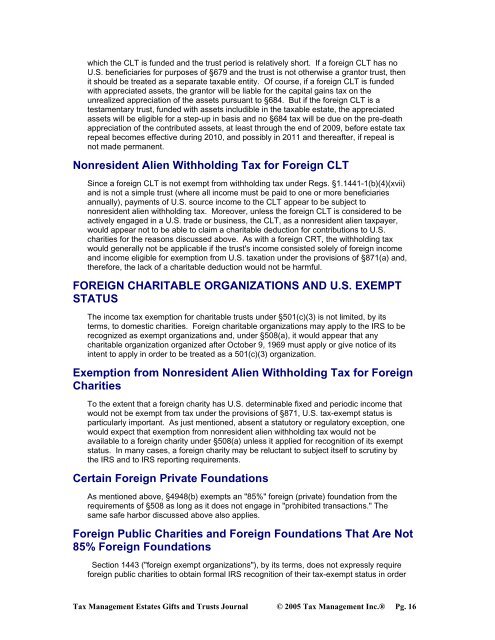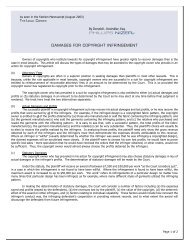International Charitable Giving And Planning ... - Phillips Nizer LLP
International Charitable Giving And Planning ... - Phillips Nizer LLP
International Charitable Giving And Planning ... - Phillips Nizer LLP
You also want an ePaper? Increase the reach of your titles
YUMPU automatically turns print PDFs into web optimized ePapers that Google loves.
which the CLT is funded and the trust period is relatively short. If a foreign CLT has noU.S. beneficiaries for purposes of §679 and the trust is not otherwise a grantor trust, thenit should be treated as a separate taxable entity. Of course, if a foreign CLT is fundedwith appreciated assets, the grantor will be liable for the capital gains tax on theunrealized appreciation of the assets pursuant to §684. But if the foreign CLT is atestamentary trust, funded with assets includible in the taxable estate, the appreciatedassets will be eligible for a step-up in basis and no §684 tax will be due on the pre-deathappreciation of the contributed assets, at least through the end of 2009, before estate taxrepeal becomes effective during 2010, and possibly in 2011 and thereafter, if repeal isnot made permanent.Nonresident Alien Withholding Tax for Foreign CLTSince a foreign CLT is not exempt from withholding tax under Regs. §1.1441-1(b)(4)(xvii)and is not a simple trust (where all income must be paid to one or more beneficiariesannually), payments of U.S. source income to the CLT appear to be subject tononresident alien withholding tax. Moreover, unless the foreign CLT is considered to beactively engaged in a U.S. trade or business, the CLT, as a nonresident alien taxpayer,would appear not to be able to claim a charitable deduction for contributions to U.S.charities for the reasons discussed above. As with a foreign CRT, the withholding taxwould generally not be applicable if the trust's income consisted solely of foreign incomeand income eligible for exemption from U.S. taxation under the provisions of §871(a) and,therefore, the lack of a charitable deduction would not be harmful.FOREIGN CHARITABLE ORGANIZATIONS AND U.S. EXEMPTSTATUSThe income tax exemption for charitable trusts under §501(c)(3) is not limited, by itsterms, to domestic charities. Foreign charitable organizations may apply to the IRS to berecognized as exempt organizations and, under §508(a), it would appear that anycharitable organization organized after October 9, 1969 must apply or give notice of itsintent to apply in order to be treated as a 501(c)(3) organization.Exemption from Nonresident Alien Withholding Tax for ForeignCharitiesTo the extent that a foreign charity has U.S. determinable fixed and periodic income thatwould not be exempt from tax under the provisions of §871, U.S. tax-exempt status isparticularly important. As just mentioned, absent a statutory or regulatory exception, onewould expect that exemption from nonresident alien withholding tax would not beavailable to a foreign charity under §508(a) unless it applied for recognition of its exemptstatus. In many cases, a foreign charity may be reluctant to subject itself to scrutiny bythe IRS and to IRS reporting requirements.Certain Foreign Private FoundationsAs mentioned above, §4948(b) exempts an "85%" foreign (private) foundation from therequirements of §508 as long as it does not engage in "prohibited transactions." Thesame safe harbor discussed above also applies.Foreign Public Charities and Foreign Foundations That Are Not85% Foreign FoundationsSection 1443 ("foreign exempt organizations"), by its terms, does not expressly requireforeign public charities to obtain formal IRS recognition of their tax-exempt status in orderTax Management Estates Gifts and Trusts Journal © 2005 Tax Management Inc.® Pg. 16




